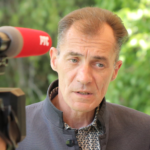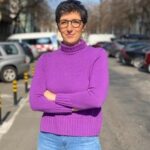Istria Media Days
15-18 October 2023, Vrsar, Croatia
Speakers


Anna Babinets
Anna Babinets is co-founder and editor-in-chief of the independent investigative agency Slidstvo.Info in Ukraine. Anna specializes in reporting about corruption in the Ukrainian Army, the security sector, and the gas and oil market. She is a 2019 recipient of the International Women’s Media Foundation’s Courage in Journalism award. She also worked on the Ukrainian segment of the Panama Papers project, which won a 2017 Pulitzer Prize.Anna Babinets received the CEI SEEMO Award for Outstanding Merits in Investigative Journalism 2022. Anna is based in Kyiv.

Antea Boko
Antea Boko holds a master’s degree in journalism from the Faculty of Political Science, University of Zagreb. Currently, she is in her first year of doctoral studies in information and communication sciences at the University North. During her undergraduate and graduate studies, she worked as journalist, and now she is employed in the field of communication and public relations. Also, she is a teaching assistant (external associate) at the undergraduate program in Communication and Media at the University of Split. Her scientific research interests are media audiences, media habits, individualization, social media, communication in the digital environment and media ethics. She is the author of two papers about ethical reporting in journalism and has participated in several scientific conferences.

Andrea Čović Vidović
Andrea Čović Vidović has over 15 years of professional experience in EU affairs, diplomacy, communication, management and mentoring. Since July 2022 she has been Head of Media at the European Commission in Croatia and Deputy Head of Commission Representation since February 2023, with the role of Acting Head of Representation since 1 July 2023. She was in charge of public relations for the European Parliament in Croatia since its inauguration in February 2013 until July 2022. She worked at the Ministry of Foreign and European Affairs as a diplomat on Croatia’s EU membership negotiations and as EU policies lecturer. Thereafter she headed EU sectors at the Ministry of Finance and the Ministry of Labour, Pension System, Family and Social Policy. During her studies, she was a freelancer on international cultural projects at the Institute for International Relations and Development in Zagreb, before being recruited as regional coordinator of international ICT projects for UNIQA insurance.
She holds a Master’s degree in contemporary European Studies from the Sussex University in the UK, as well as in German and English Studies from the University of Zagreb. She studied International Relations and German Studies at the Technical University of Dresden and conducted her PhD research in Comparative Politics at the University of Zagreb and the Johns Hopkins School of Advanced International Relations in Washington DC. She is alumna of the German Academic Exchange Service (DAAD), the US Fulbright Programme and the British Chevening Programme. A volunteer in several non-profit organisations, she is the author of projects „Women in the Lead“ for the Academy for Political Development and „AI in PR: Educating the Next Generation of Communicators“ for the Croatian Public Relations Association.

Aleksandra Markić Boban
Aleksandra Markić Boban graduated from the Faculty of Humanities and Social Sciences of the University of Zagreb in English and German Language and Literature (MA), and holds a MScs in European Studies from the Faculty of Political Science of the University of Zagreb. Before joining the Hanns Seidel Foundation, Aleksandra worked for the ECMM and the EUAM as well as for the German Ambassy in Zagreb. In her capacity as the Head of Project Office in Zagreb she was responsible for initiating and conceptualizing more than 1,000 events dealing with international politics, diplomacy, law, and local self-government. Her focus is on the European affairs, international affairs, and development cooperation. Aleksandra is co-editor of the book “Public Diplomacy: Nation Branding and Image” and co-editor of the collection of papers “A Chance or a Threat? Reform of Local and Regional Self-Government in Croatia”.

Boris Bergant
born 19.4. 1948, Maribor, Slovenia
Media Adviser
Experience in broadcasting: Editor of foreign affairs, Editor in chief news and current affairs, Deputy Director at TV Slovenia, radio programming, Deputy Director General RTV SLO 1989-2006
1990-1992 President of Circom Regional, European Association of Regional Television
1990-1992, and from 1996-2006 member of the Administrative Council of European Broadcasting Union (EBU)
1993-1998 Vice Chairman of the TV Committee of the EBU, on its behalf also member of the EBU Radio Committee
1995-2001 Secretary- General, Circom Regional
1998-2008 Vice President of the European Broadcasting Union (EBU/UER)
2009- Senior Consultant, EBU
working as consultant for broadcasting management, content, organisation
( developed Strategies of Public Service Media in Slovenia, Moldova, Georgia,
Serbia, Croatia, Montenegro, Ukraine ),
consulting media in Serbia, Slovakia, FYR Macedonia, Armenia, Kyrgistan, Bosnia
and Hercegovina, Kosovo, Lithuania, Cyprus, Portugal, Austria, Italy
2010 President, Board of SEEMO ( South and East Europe Media Organisation),Vienna
Representative of the Republic of Slovenia in different media committees of the Council of Europe ( 2004-2008 Chairman of the Standing Committee on Transfrontier Television).
Member of the International Academy of Television Arts & Sciences in New York.
Member of the World Committee ISAS for standardisation of broadcasting, Internet and press.
Experience in journalism: journalist by profession, President of the Slovenian Journalist Association (1987-1991).
Awarded with high recognitions for journalistic work:
Tomšičeva nagrada for the best journalistic achievement in Slovenia, rewards at the TV festivals Monte Carlo, New York, Leipzig
Busek Award for outstanding achievements
Publishing in the field of foreign politics and broadcasting
Foreign languages: English, German, Italian, Serbian/Croat

Daria Grudić
Daria Grudić is a Distribution Manager in the Distribution Europe department at Deutsche Welle. Her main responsibilities include the distribution of DW content in the Benelux countries, along with the distribution of the German News Service project in Europe, with a special emphasis on the Balkan countries.
Daria’s academic journey led her to earn a Bachelor’s degree in Journalism in Zagreb, Croatia.
She worked for 8 years as a journalist and editor across various media platforms in Croatia,
spanning from online and radio to magazines. In 2015 she moved to the Netherlands to pursue
a Master’s degree in Media Innovation. In 2021, Daria joined the Distribution Europe team at
Deutsche Welle and moved to Germany
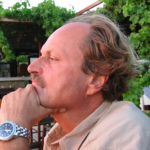
Dimitris Charalambis
Dimitris Charalambis is Professor emeritus for Political Science of the National and Kapodistrian University of Athens, School of Economics and Political Sciences, Department of Communication and Media Studies. He is President of the Hellenic Political Science Association (HPSA). Professor Charalambis studied Political Science, Sociology and Philosophy at the University of Freiburg in Germany and has a PhD of the University of Muenster in Germany on Political Sociology (summa cum laude, Award of excellence for the Humanities of the University of Muenster for 1980). After a post Doc Diss. (military sociology) at the University of Freiburg he was elected Assistant Professor at the Panteion University (University for Political Science and Sociology) in Athens (1985). 1991 Professor Charalambis was elected Associate Professor and 1998 full Professor at the National and Kapodistrian University of Athens, in which he continues teaching since 2019 as Professor Emeritus. Between 1994 and 2002 he was elected Director of the Institute of Political Sociology at the National Center for Social Research (NCSR-EKKE). 2002 and until 2008 he was appointed Vice-President of the National Council for Radio and Television (the Greek Independent Authority for Broadcasting-ESR) through unanimous decision of the Greek Parliament. He was Director of the Section of Political and Social Analysis of Communication (1994-2004) and Head of the Department of Communication and Media Studies at the National and Kapodistrian University of Athens (2014-2016). Between 2005 and 2018 he was Deputy Director and since 2018 Director of the University Research Institute of Applied Communication (URIAC) at the National and Kapodistrian University of Athens. He was visiting Professor at the Institute for “Publizistik und Kommunikationswissenschaft” at the University of Vienna, at the Athens University of Economics (OPA) and at the Postgraduate Program of the Department of Political Science and Public Administration of the National and Kapodistrian University of Athens. He was Professor for Political Science at the National School of Judges (ESD), at the National School of Public Administration (ESDDA), at the Hellenic Naval War College (ASPN-HNWC) and at the Higher Interdisciplinary Warfare School of the General Staff of National Defense (ADISPO) and civil member of the Commission for the review of conscientious objection of the military service. He was also Media and Political Expert of the European Program (Institution Building) “Deepening Democracy in Uzbekistan” in Tashkent in Uzbekistan. He was appointed Evaluator of the University of Crete and Evaluator of the Department of Journalism and Mass Communication of the University of Prishtina in Prishtina (Kosovo). He is member of the European Society for Communication and Education (ESEC) in Vienna, member of the Gesellschaft für Pädagogik und Information (GPI) in Berlin, member of the Rencontres Interdisciplinaires Franco-Helleniques (Paris and Athens), member of the Ionian Academy 1808 in Corfu and member of the Board of Directors of the Centre for the European Constitutional Law in Hagen and Athens (CECL).
Professor Charalambis is author and editor of several books in Greek, German and English and of more than 50 scientific articles on political theory, theory of Democracy, European integration and traditional and digital media. He also was speaker in more than 60 national and international symposia and congresses and was invited for lectures in several Universities in Europe, the U.S., Canada and China. Between 1994 and 2004 Professor Charalambis was coordinator of 17 European and National Research Projects and between 1998 and 2022, partner in 7 Leonardo Da Vinci and Grundtvig European Projects.
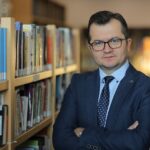
Erlis Çela
Dr. Erlis Çela is an Assistant Professor at the Department of Communication Sciences, Beder University College in Tirana, Albania. His research interest includes the role of social media in journalism, disinformation, and media literacy.

Elizabeta Gojan
Born on December 18, 1961. in Banja Luka, Bosnia and Herzegovina.
Citizenship: Croatian
telephone /work/: +385 1 634 35 13
cell Phone /work/: +385 99 634 84 05
email: egojan@hrt.hr
EDUCATION
Graduated from Zagreb University – Faculty of Philosophy, Phonetics and General Linguistics – in 1986.
EMPLOYMENT HISTORY
September 1987. /as co-worker/ from August 1991. – present, as permanent journalist /commentator/ in Foreign Affairs Department of the Croatian Television Zagreb
Zagrebačka panorama – local News Show ( 1988. – 1990.)
presenter and editor in Hrvatska danas – News Show (1998. – 1991.)
presenter and editor in Vijesti – News Show (1991. – 1992.)
war reporter ( 1992. – 1995.) in Croatia and Bosnia and Herzegovina
presenter and editor in Dnevnik – Main News Show (1993. – 1995.)
reporter and editor in Foreign Affairs ( from 1992. )
LIVE EVENTS : Author and Host
Bombing raids of Yugoslavia
Slobodan Milošević arrest, 09.11.2002.,
US Presidential Election 2004. ,
US Presidental Election 2012.
Washington Agreements 1994.
September 11. 2001. – Terrorist attack on America at the World Trade Center Towers in New York City and The Pentagon in Washington,
Inauguration of Kolinda Grabar Kitarović, fourth Croatian president, 2015.
Inauguration of Ivo Josipović, third Croatian president, 2010.
Royal Wedding or Prince William and Catherine Middleton, may 2011.
Author and Talk Show Host „Damin Gambit“ – female talk show 2012. – 2015.
– reporter from war zone – Macedonia, Kosovo, Ukraine

Ivan Lovrecek
Ivan has over 20 years of international professional experience as a producer, media executive and consultant. He began his career as a reporter on a local radio and in 2001 he became producer and presenter at BBC World Service in London. In 2004, Ivan participated in the launch of national commercial TV channel RTL Croatia (RTL Group). During 14 years at RTL he held various leadership roles, from Editor-in-Chief to Deputy CEO. With his strong ability to build and lead teams as well as expertise in editorial and production, Ivan oversaw news, current affairs, sports, and digital operations, achieving record results. Currently, he is Managing Director at Videoclick, providing social media data analytics and strategic consultancy to publishers and commercial brands. Ivan holds MBA with specialization in the Creative Industries.

Istvan Deak
Istvan Deak is a Romanian journalist based in Brașov, Transylvania, who works for the online media platform editiadedimineata.ro. With nearly 18 years of experience in the field, he has had a distinguished career in journalism, which includes international experiences. Istvan served as an intern at the European Parliament due to a Robert Schuman fellowship, and has participated in various media programs, including the Robert Bosch Stiftung, Central and Eastern Europe Journalist Fellowship Program, European Journalism Fellowships (EJF) and Medien – Mittler zwischen den Völkern. He is an alumnus of the Internationale Journalisten Programme and currently holds a board member position at SEEMO (South East Europe Media Organisation). Additionally, Istvan is an active member of CLEW (Clean Energy Wire Network). As journalist, he covers European and international topics, with a particular focus on migration, gender equality, climate, and social issues.
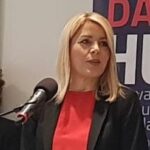
Jasna Vaniček-Fila
Jasna Vaniček-Fila graduated from the Faculty of Humanities and Social Sciences of the University of Zagreb in Italian and Czech language and literature. At the Faculty of Economics and Business of the University of Zagreb, she completed the FBA specialist study program Entrepreneurship in the Knowledge Economy – Competitiveness.
She has almost 20 years of work experience in the media, most of which is in the electronic media – as a journalist, reporter, presenter, editor-in-chief and director. She was a journalist and editor with ten years of experience in the informative program on Croatian public television. In the period from 1998 to 2008, as the only journalist on HTV as part of the multinational magazine Prizma, she was also the author of more than 400 reports, news, interviews and documentary shows in the Czech language. She was the editor-in-chief of the informative program of the Bjelovar-Bilogora County Radio, director and editor-in-chief of Media Servis, the largest Croatian private media agency specializing in the production of radio programs. She is the author of several television reports broadcast in the EBU Eurovision exchange program.
In the Ministry of Tourism, she worked as the head of the Independent Department for Public Relations and as a spokeswoman. Likewise in the tourism sector, she also worked as the director of the Tourist Board of the Bjelovar-Bilogora County. Since 2016, she has been an external associate – assistant, and in 2018 she acquired the status of lecturer – external associate on the Media and Tourism course at the Libertas International University in Zagreb. From 2017 to 2021, she worked in the Office of the President of the Croatian Parliament, as a media adviser to the President of the Parliament. Since February 2021, she has been the Director of the Directorate for Media and Development of Cultural and Creative Industries of the Ministry of Culture and Media.
She completed several international media trainings and educations, such as the CIRCOM Television Journalism Workshop in Krakow, Poland and in Košice, Slovakia, as well as international training for media editors at the Europaiche Akademie in Berlin, and then she herself was a mentor at several journalism trainings and seminars and media training programs.
She was a member of the judging panel of the Croatian Journalists’ Association in 2013 for the annual journalism awards for the best journalists in Croatia, and in 2013 and 2014 a member of the jury of the business weekly Lider for the “Hrvoje Mateljić” award for the best business journalists in Croatia.
She also worked as a translator, dealing with the Czech, Italian and Slovak languages. She gave a series of expert presentations at the International Symposium on the Czech Language, and her papers from those presentations were published in the proceedings “Přehled” (2013, 2014, 2015, 2016).
She was a winner of a special award for the preservation of the cultural heritage of national minorities at the 5th International Radio and Television Festival “My Homeland” in 2003 in Uzhgorod, Ukraine, in competition with 114 films from 22 countries, in co-authorship with Daniela Draštata for the Czech-Croatian bilingual documentary show on HTV “Dožínky – Czech harvest festivities ».
At the international festival of tourism, landscape and film INTERSTAS, she won the “Golden Interstas 2015” award, awarded by FIJET – the World Federation of Travel Journalists and Writers in Tourism.

Jessice Acquavita
Jessica Acquavita završila je studij scenskih umjetnosti 2010.
godine na Filozofskom fakultetu u Trstu. Paralelno uz sveučilišni studij pohađala je i dvogodišnje školovanje pri Dramskoj akademiji Grada Trsta u organizaciji Gradskog kazališta ”La Contrada”, gdje je diplomirala 2009. godine.
Magistarski diplomski studij uživo izvedenih scenskih umjetnosti završila je 2013. godine pri Sveučilištu u Bologni.
Tijekom studija sudjelovala je u raznim kazališnim projektima kao glumica i pomoćnica redatelja, a pohađala je i radionice režije, sinkronizacije i spikerskih vještina.
Od 2013. do 2020. godine radila je kao novinarka, urednica i voditeljica na talijanskim televizijskim i radijskim emisijama Regionalnog centra RTV Slovenije u Kopru.
Godine 2017. započela je suradnju s Primorskim sveučilištem u Kopru kao asistentica za
kolegije fonetike i fonologije talijanskog jezika, a od akademske godine 2018./2019. surađuje
i s Pedagoškim fakultetom u Kopru u svojstvu asistentice za kolegije glazbe, talijanskog jezika
i plesnih umjetnosti.
Trenutno pohađa doktorski studij modernih jezika, kultura i društava te jezičnih znanosti pri
Sveučilištu Ca’ Foscari u Veneciji.
Kao pripadnica talijanske nacionalne zajednice oduvijek se angažirala u institucijama
zajednice. Upravo je taj angažman bio polazište njezinog političkog djelovanja: 2017. godine
izabrana je za zamjenicu gradonačelnika Grada Buja, a tu je dužnost obnašala do 2021.
godine.
Od svibnja 2021. godine obnaša dužnost zamjenice župana Istarske županije izabrane iz
redova talijanske nacionalne zajednice.

Jochen Spangenberg
Jochen Spangenberg is Deputy Head of Research and Cooperation Projects at Deutsche Welle. The topical focus of his work over the past decade has been on research dealing with social newsgathering, disinformation analysis and verification of digital content, and relating all this to the news and information sector.
Jochen also lectures at the Free University Berlin in Media & Communication Sciences, is an active supporter of Lie Detectors, and sits on the Advisory Boards of EDMO (European Digital Media Observatory) and the so-called EDMO Hubs CEDMO and GADMO.

Jorgos Papadakis
Jorgos Papadakis is the Managing Director of the European Jewish Association and the Europe Israel Press Association (EJA-EIPA) since January 2023. Prior to it, he served as Deputy Director of the World Savings and Retail Banking Institute – European Savings & Retail Banking Group (WSBI-ESBG) and as Marketing & Communication Director of the European Venture Philanthropy Association (EVPA). He was also active for 5 years as Head of Communications for the European Free Alliance-European Political Party in the European Parliament. He has worked for various national, regional and European media outlets, including the BBC and the Austrian Press Agency and has also served as a Board member of SEEMO and Special Advisor to the SEEMO Secretary General on minority media. He also co-authored the SEEMO Safety Net Manual.
His other assignments include managerial and advisory positions at UNDP, PR agencies and private corporations in Greece and the Balkans. He was also the Executive Director of the Balkan Youth Foundation, a regional non-governmental organization focusing on youth empowerment through social investment in the region of South East Europe.
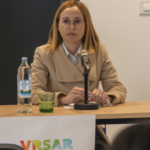
Klara Trošt Lesić
PhD Klara Trošt Lesić, director of Vrsar Tourist Board. With her fifteen-year-long scientific and professional experience in the fields of event analysis and sustainable tourism at both international and national levels. In 2012, she gained a doctoral degree in social sciences at the Faculty of Economics in Split, with the topic entitled “Event evaluation for the purpose of sustainable development of tourism destinations”. She is a member of the Global Sustainable Tourism Council (GSTC), the Croatian Meeting Professionals Association (CMPA). She continues to invest in her education and, in 2017, she acquired the Certificate in Sustainable Tourism (Sustainable Tourism Training Program – STTP). In 2018 she became the Certified Croatian meeting and events professional (CCMEP) and in 2019 the Certified Interpretive Guide (Interpret Europe – CIG). Her other passion is olive oil; since 2009, she has been a member of the Panel for sensory analysis of virgin olive oils of the Institute of Agriculture and Tourism in Poreč and her name is included in the National list of virgin olive oil assessors. Since 2012, she has worked as an external associate staff member, assistant at the Faculty of Economics and Tourism “Dr. Mijo Mirković” at the University in Pula.

Klaus Fiesinger
Dr. Fiesinger received his Ph.D. in political science from the University of Munich. He is author of the book “Ballhausplatz-Diplomatie 1945-1949.” From 2004 until 2012 he was visiting professor at the Andrassy University in Budapest. Occasionally he gives lectures on Euroregions, cross-border police cooperation and political education. Furthermore, Dr. Fiesinger is member of IDM, the Austrian Institute in Vienna for the Danube Zone and Central Europe as well as of “Südosteuropa Gesellschaft”. Since 1992 he has been head of the Division for Central, East and Southeast Europe and Central Asia at the Hanns Seidel Foundation in Munich and as of 2015 he is regional director for South-East Europe.

Lejla Turčilo
Dr. sci. Lejla Turčilo is a full time professor at the Department of Communication Science/ Journalism at the Faculty of Political Science, University of Sarajevo, Bosnia-Herzegovina, where she teaches courses in Media Theory, TV Journalism, Online Journalism and Media and Politics at the undergraduate and master’s degree level and Creation of New Public by PR and Online Media at the Doctoral Study. She has published four authored books, six co-authored books, as well as one manual and five research publications. She has published more than forty scientific and professional papers in Bosnia and Herzegovina and abroad. She is the head of the Center for Lifelong Learning at the Faculty of Political Sciences of the University of Sarajevo and the head of the Department of Communication Science/ Journalism. Her field of interest is online communication, intercultural communication, media literacy and media freedom.

Ljiljana Zurovac
Ms Ljiljana Zurovac is an independent Media Expert and Journalist.
Since 1980 she worked as Radio and TV journalist, Editor and Host of live Radio and TV programs at JRT – RTV Sarajevo, PBS B&H, and Radio FERN, where she was specialized also in debate programs based on Conflict Resolution skills.
Apart from her career as an active Radio-TV journalist, she worked for six years as the Head Master at the Regional High College of Journalism Media Plan (1999 – 2005).
In 2005 she established the first media self-regulatory body in the Region of Western Balkans and SEE, the Press Council in Bosnia and Herzegovina, where she served as the Executive director for fifteen years, until 2020.
She worked on many projects and missions of promoting and establishing of media self-regulatory bodies in the countries of the new democracy in Europe, Asia (Myanmar, Mongolia, and Tajikistan) and MENA countries, providing her services as an Expert Consultant with an extensive field knowledge of the subject, and she regularly participates in the local and international conferences as a panellist, talking about media freedoms and media self-regulation.
Ms Zurovac is an adept lecturer and trainer, and regularly teaches in the fields of Media Ethics and Media Self-regulation, Media Literacy, and Conflict Resolution.
Within the Press Council in B&H, she established The School of Media Ethics for students of journalism, a specialized 7-day intensive programs teaching young and soon to be journalists about professional standards and media ethics.
She created a range of specialized Media Literacy workshop-programs for not only the students of journalism but also for elementary and high-schools’ students and professors, citizens, judiciary and political structures, as well as several public campaigns against Hate Speech and Fake news in Online media.
She is the founder and producer of the radio show “Your Voice in Media – ZOOM”, covering topics of media ethics and media self-regulation – which ran for 6 years with a team of ten young journalists. The show was broadcasted weekly on the PBS and local radio stations across BiH. The show covered the topics of media freedoms, media literacy, human rights and the citizens’ rights to complain about the inaccurate media reporting, and the methods to fight against hate speech and fake news.
With a team of media professionals, she executed three massive public campaigns under the name of “Stop! Hate Speech”, and with the aim to fight hate speech in the online media, both in the editorial and in public UGC comments.
From 2014 to 2016, Ms Zurovac was a part of the RFoM OSCE Vienna Task group, where she performed as an Expert Consultant, on tasks of creating and amending Code of Ethics for Journalists in Montenegro. And in 2019 – 2020 she was a Consultant for OSCE mission B&H, in creation, development, and promotion of the Guidelines for Journalists – Reporting on Violent Extremism and Terrorism, and as the Expert Consultant for OSCE mission in North Macedonia she was a leader of the Task group for creating the ethical Guidelines for online media in North Macedonia.
She is currently a member of the Fetisov Journalism Awards Experts Council Jury, and between 2013 and 2016 was a Member of the UNESCO/Guillermo Cano World Press Freedom Price Jury, finally serving as a President of this Jury in 2016.
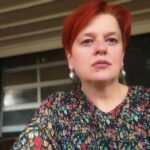
Marina Constantinoiu
Marina Constantinoiu studied journalism at Bucharest University and began her career as a journalist during her first semester of studies. With nearly 33 years of experience in the field, she has held various significant roles, including Head of the Foreign Desk, Deputy Editor-in-Chief, Editor-in-Chief, and Project Coordinator. Her career has spanned across different media platforms, starting with public radio, national daily newspapers, press agencies, and online multimedia news websites.
In addition to her extensive professional background, Marina is actively involved in various media organizations. She serves as a board member of SEEMO (South East Europe Media Organization) and is a member of EJA (European Journalists Association) and CLEW (Clean Energy Wire Network). Marina has received two awards for investigative journalism and is an alumna of the Robert Bosch Foundation’s “Reporters in the Field” media program and the IJP (Internationale Journalisten Programme), the German-Central Eastern European Bursary program.
Furthermore, Marina shares her knowledge and expertise by teaching journalism at Bucharest University, specifically at the Faculty of Journalism and Mass Communication, where she works with MA students.

Marina Rigou
Marina Rigou is an Assistant Professor of Journalism and New Media at the Department of Communication and Media Studies – National and Kapodistrian University of Athens (UoA). Member of the Laboratory Teaching Staff at the Department of Communication, Media and Culture at Panteion University since 2004 till 2017 she taught “Multi Media Journalism”, “Radio Broadcast Production” and “Introduction to Reporting”.
She holds a PhD Degree (marked Excellent) from the University of Athens on “Contemporary Forms of Publicity, New Media and Politics”. At the same University she has also accomplished her studies on Physics Sciences at the Department of Physics, Faculty of Mathematics and Physics, followed by a Degree in Communication and Mass Media Studies, in which field she acquired her postgraduate degree too.
She is the author of a book titled From Digital Revolution to Digital Surveillance. New Media, Publicity and Politics (Sideris Publishing House, 2014). Many articles and research papers of hers dealing with issues concerning communication, media and politics, have been published in scientific journals and books. She has conducted researches on the topics of the Internet, Politics, Public Opinion, Journalism and Mass Media. She has also carried out extended research on “Macedonian Issue” and the “Imia Islands Incident” as well. Among the multidiscipline conferences she was invited to speak are indicatively the 5th Greek-Turkish Journalists Conference “Reporting the Normal” organized by the Greek Turkish Friendship Association, the Greek Tourism Ministry and the Turkish Press Ministry on June 2008 and the International Workshop: “Europe’s new Mediterranean Reality: Migration and Asylum”, conducted by the European Parliament Offices in Greece, in Malta and Cyprus on July and September 2011.
She is a member of: Greek Journalists Association, International Federation of Journalists, Hellenic Political Science Association and Hellenic Sociological Society.
Marina Rigou has been a journalist for more than 32 years and has worked for many organisations like Greece’s Public Broadcaster, Flash Radio, USA Today, The Christian Science Monitor, Global Post, and many others. Occasional reporting for BBC Radio5, Sky News, i24news, Berlingske (2018).
On June 2008 she was awarded the radio broadcasting European Journalism Award for her program “A trip at space and time” on the Lisbon Treaty.

Marija Slijepčević
Works as a senior lecturer at VERN’ University in Zagreb and as executive editor of scientific journal Contemporary Issues. She lectures on subjects such as Media Relations, Public Relation Basics, Specialized Journalism, Media Literacy and fact-checking, Mass Media Theories… She is the author of 15 scientific and professional papers in the field of communication studies.
She graduated journalism from the Faculty of Political Sciences and post graduated organization and management from the Faculty of Economics, both University of Zagreb. She is currently a PhD candidate in Communication Studies at the University of Osijek.
She owns a PR agency The Galerija and is a member of The Croatian Public Relations Association (HUOJ) and The Council for Publishing and Education member. Before university she worked in various Croatian media.

Marko Milosavljevic
Marko Milosavljevič is a Full Professor, Ph.D., at the Section of Journalism at the Faculty of Social Sciences, University of Ljubljana, Slovenia.
He is a Head of the Department of Communication at the Faculty of Social Sciences.
He is a member of the Committee of Experts on Media Resilience and Sustainability (MSI-RES) at the Council of Europe (2022-).
He was a Vice-Chair of the Committee of Experts on Media Environment and Reform (MSI-REF) at the Council of Europe(2020-2022).
He was the chair of Communications Law and Policy section of European Communication Research and Education Association (ECREA) (2018-2021)
He was a member of the Core Experts Group for Media and Culture (EENCA), advising European Commission on culture and media policy (2016-2020).
He was interviewed and quoted in publications such as The New York Times, Financial Times, Reuters, Al Jazeera English, Euronews, Le Monde, Liberation, La Croix, Radio France, Deutsche Welle, ARD, ZDF, Der Standard, Falter, Politico, Euractiv, Bloomberg, L’Espresso, Balkan Insight, Polish digital Višegrad Insight, Czech daily Britske Listy, Swedish public radio, Swedish commercial television TV4, Swedish daily newspaper Dagens Nyheter, Dutch newspaper de Volkkrant, and others.
He is a member of Horizon2020 project DIACOMETT on digital regulation and selfregulation. He was a member of the consortium for European Commission’s research on media ownership, EurOMo. He was a member of Horizon2020 project EMBEDDIA, researching artificial intelligence in the media and newsrooms.
He spoke at the conferences and as keynote speaker at conferences at MIT Boston, National Press Club in Washington D.C., Ryerson University Toronto, St. Johns University New York, Katholieke Universiteit Leuven, London School of Economics, Central European University Budapest, Munich LMU University, Complutense Madrid, Lusofona Lisbon, Lund University, at conferences by European Commission, UNESCO, ECREA, IAMCR, ICA, the Council Of Europe, European Parliament and others.
Lately his research is focused on the issues of media and platforms policy, media funding and regulation, political economy of digital media, .
Since 2016, he is head of the Media Pluralism Monitor project with European University Institute Florence for Slovenia. The project is the key project regarding media by the European Commission and is the basis for The Rule of Law reports by the Commission, published in 2020.
He conducted research for European Public Regulatory Authorities (EPRA), Hans Bredow Institute Hamburg, European Journalism Centre Maastricht, Donau-Universitat am Krems, Media Centre Sarajevo, Open Society Institute London, Serbian Ministry for Higher Education, and others. He was an evaluator of South-Eastern European Network for Professionalisation of Media (SEENPM) for Slovenia, Croatia and Bosnia and Herzegovina.
He has worked on national, regional and comparative research on a number of issues, including public broadcasting, digital transition, digital business models, OTT economic potential in Central Europe, development of television services, ownership and transparency of media, including pluralism indicators.
His research of media, journalism, media policy and digital issues in Slovenia and EU has been published in books and scientific journals in United States, Germany, France, United Kingdom, Norway, Austria, Bulgaria, Croatia and Netherlands.
He was a member of the experts group at the Slovenian Ministry of Culture, adopting the new Mass Media Act in 2019. He was a chairman of the Expert commission for Pluralisation of Media at Slovenian Ministry of Culture (2009-2010), a member of Experts’ group for new Mass Media Act (2009 and 2018) and Public Broadcasting Act (2009) at Slovenian Ministry of Culture.
He was a member of National Committee for Information Society since 2010.
He is a member of the Ethics Committee of Slovenian Advertising Chamber.

Milorad Ivanovic
Milorad Ivanovic, Serbia, is the editor-in-chief of BIRN Serbia, the Balkan Investigative Reporting Network. Previously, he was editor-in-chief of Newsweek Serbia magazine, deputy editor-in-chief and executive editor of the daily newspaper Blic and executive editor of Novi Magazin weekly. His articles have been published in newspapers such as El Mundo in Spain, The Mail on Sunday and The Sunday Times in England, The Washington Times and Der Standard in Austria. Ivanović has collaborated with journalists worldwide on transnational investigations, including SCOOP, SEEMO and the Dart Center for Journalism and Trauma. In collaboration with the BBC World Trust Fund, he produced the documentary “Hidden Wounds” on post-traumatic stress disorder. He was an Internationale Journalisten-Programme’s (IJP) fellow at Süddeutsche Zeitung. Milorad is a member of ICIJ and one of the co-founders of EIC (European Investigative Collaboration).

Nana Walzer
Nana is a communication expert, moderator and author, living in Vienna, Austria. With her company Walzer COM, she works with individuals, firms and institutions, e.g., in the fields of leadership, communication, and strategy. Her professional approach targets the potential of her clients – be it personalities or organizations – in the context of societies’ current challenges. By focussing on the interconnectedness of individual, interpersonal and trans-subjective patterns of behavior, Nana aims at a synergy-effect on an systemic scale, thus allowing growth on all three levels simultaneously.
Nana Walzer received her PhD from the Institute of Communication Sciences at the University of Vienna, Austria, and gives lectures on communication in different Austrian university courses. She regularly appears as expert for communication in e.g., the Austrian Broadcasting Corporation, ORF, on both television and radio. In a variety of podcast-series, she interviews for example Members of the European Parliament on Europe’s burning issues.
As author, Nana released her second book about contemporary leadership, called “The Bright Side of Power” in 2020. In 2019, she published two educative books: “The Education of Humanity for Youth” and “The Education of Humanity for Adults”. She co-wrote and co-edited the scientific anthology “The Evolution of Humanity” and co-wrote the leadership-book “Open Minded Leadership”, both in 2017. Her first book-release was a book about personal development: “The Art of Connection”, (2016). Her audio-book of “The Art of Connection” was first published in 2017, and re-published in 2022. Please be aware that all publications are written in German.
Nana Walzer is an academic expert on European Communication and develops communication strategies for European civil-society organizations. She co-initiated and heads the pro-European NGO “Europe:United” – Organization for a Human Europe (www.europeunited.eu).
For her pro-European and democracy-political activities such as her Video-Podcasts, TV-Shows, seminars, lectures and speeches, she received several awards, such as in 2022 the Mérite Européen Medal, in 2021 the Kaiser-Maximilian Preis and in 2020 an EESC-Award. Her engagement was also honored by the Republic of Austria with the Europa-Staatspreis 2018 and 2023.
More information: http://www.walzer.eu

Nataša Ružić
Nataša Ružić is a professor at the Faculty of Political Science of the University of Montenegro in Podgorica. She graduated from People’s
Friendship University of Russia (Department of Journalism), Moscow. Upon graduation, she was awarded a scholarship for MA studies at the same university. She defended her PhD dissertation at the Faculty of Political Science, University of Montenegro in Podgorica in November 2010, where she has been teaching Introduction to Journalism, History of Journalism, Media in Crisis Situations and Journalist Ethics since September 2011.

Oddgeir Tveiten
Oddgeir Tveiten (PhD) is a Fulbright scholar and professor of media studies at the University of Agder and the NLA University College, in Southern Norway. Prior to coming to UIA and NLA, Tveiten was an associate professor at the University of Bergen and Norwegian Business School in Oslo, as well as a researcher at the University of Oslo. His postgraduate degrees are from the School of Journalism and Communication at the University of Minnesota — in Minneapolis, his second home. Tveiten has published extensively in the area of global journalism, conflict communication and globalization studies. In more recent years, he has addressed issues concerning the globalization of education and learning. Like journalism, education is a social institution challenged by the political economy of digitalization and globalization.
In 2010 he set up Future Learning Lab, an international research community that also runs the annual World Learning Summit, attracting attendees from 35+ countries. He has contributed to the setting up of MA and PhD educational programs in several East-African countries. He teaches journalism and communication frequently in Uganda and Ethiopia. He also lectures widely in Europe on issues in journalism, communication and the future of education in a globalized world. In 2015 he collaborated with Stanford University and the global learning platform EdCast in setting up a conference on Future Learning, at Stanford University, visited by high-level speakers and educators from key institutions internationally.

Ognian Zlatev
Ognian Zlatev has over 30 years of professional expreience in the field of public diplomacy, communication, media and NGO development as well as public administration. During the last 25 years he acquired profound knowedge about the policies of the European Union and about the functioning of its institutions and was and is directly involved in the implementation of a number of European Commission’s programmes such as ERASMUS/ERASMUS+, Creative Europe, European Solidarity Corps, etc.
Between 2019 and 2023 he was Head of European Commission Representation in Croatia and before that between 2013 and 2019 he was representing the European Commission in Bulgaria. Both positions require daily interaction with highest political authorities of both countries and with the political leadership of the European Commission as well as with the diplomatic corps, academia, media and NGOs. O particular imporatnce was his involvement in the 2018 Bulgaria’s Presidency of the Council of the EU and 2020 Croatia’s EU Presidency.
Previously, Ognian Zlatev was Head of Communications Unit at DG for Employment and Social Affairs of the European Commission. Before joing the European Commission he served as a member of the Management Board of the Bulgarian National Television. In 1998 in Sofia he founded Media Development Center and was among the founding members of the South East European Network for Professionalisation of the Media. He has done consultancy and field work for the World Bank, UNESCO, OSCE Representative on the Freedom of Media and authored a number of publications on the topics of press freedom, media self-regulation, communication.
Ognian Zlatev is an active member of international media and communications entities like SEEMO, EACD. Currently, he chairs SEECOM – South East Europe Public Service Communication association.
He holds M.A. on Classics from St Kliment Ohridski University of Sofia. Subsequently, he received qualifications in political communication, public diplomacy, management, etc. Ognian Zlatev is alumnus of the Rising Public Leaders Executive Management Programme of the Blavatnik School of Government at the University of Oxford.
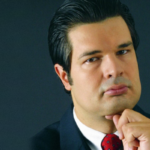
Oliver Vujovic
Oliver Vujovic is a co-founder of the South East Europe Media Organisation (SEEMO) and since 2000 has been SEEMO Secretary General. Vujovic worked as a journalist and Balkan correspondent for the Austrian daily Die Presse between 1991 and 2000, and as a freelancer for different media in Germany, Austria, Switzerland, and the UK. He also worked in the marketing department of the German company Henkel. He graduated in economics and is currently working on a PhD at the University of Vienna. Vujovic started his professional work as a journalist for Radio Indeks 202 (Radio Belgrade) in Belgrade (1988) and worked from the founding for Radio B92 in Belgrade (1989). In 2000 and 2001, he served as Director of the Vienna Balkan publication Südosteuropäischer Dialog, and Director and Advisor of the Kulturzentrum in Vienna.
Vujovic is also a founder and Deputy Director of the South-East and Central Europe PR Organisation (SECEPRO) in Vienna and of the International Institute – International Media Center in Vienna. He is also co-founder and Deputy Director of the International Academy in Belgrade. He is author, co-editor, editor, and publisher of numerous books, magazines, publications, research articles, and research papers.
Oliver Vujovic was member of different boards.
Currently he is member of the ECPMF (Leipzig, Germany) Supervisory Board.
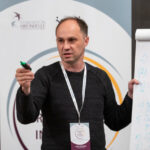
Oleksiy Soldatenko
Oleksiy Soldatenko is co-founder and Programs Director of the International Institute for Regional Media and Information (IRMI, Ukraine). He is a media and Public Relations expert, a trainer, and a training organizer with more than 30 years of experience.

Sasa Lekovic
Sasa Lekovic is the President of NGO Investigative Journalism Center, based in Croatia. From 2015 to 2018 he was a president of the Croatian Journalists Association. He is freelance reporter, editor, trainer and media consultant from 2003.
Lekovic is journalist for the past 44 years working in different position in local and national print media, radio in Croatia. He is one of the founders of a Zagreb-based national daily “Jutarnji list”. He also has expertise in radio, TV and web media in Croatia as well in South East Europe region.
As a reporter and editor as well as a licensed investigative reporting trainer and lecturer he has worked with a few hundred of journalists and journalism students, mostly in South East Europe but also in other European countries as well as and in Armenia, Bangladesh, Israel/ Palestine, Nigeria…
Sasa Lekovic is one of the founders of Global Investigative Journalism Network.
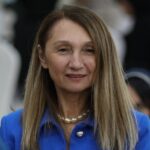
Snježana Milivojević
Snježana Milivojević (PhD Sociology/Communication) is Professor of public opinion and media studies. In the academic 2022-2023 she has served as dean of Bayan College, Purdue University Northwest USA affiliate in Muscat, Sultanate of Oman. Prior to that Milivojevic was a long time professor at the University of Belgrade – Faculty of Political Sciences where she chaired Doctoral program in Culture and Media, MA program in Communication and was the founding chair of the Center for Media Research. She was International guarantor and visiting professor at University of New York in Prague, Co-Director of the international post-graduate course Comparative Media Systems at the Inter University Centre in Dubrovnik, Fulbright visiting scholar at Columbia University, Chevening scholar at St. Antony’s College, Oxford University and visiting lecturer at several European and American universities.
Snjezana Milivojevic has participated in many international research projects concerning digital transformation of society, media and journalism with main academic interests in political communication, media policy, cultural and gender studies, and media and public memory.

Stojan De Prato
Born in Rijeka, Croatia, on 16.02.1957, Stojan is a general linguist and cultural anthropologist by education and journalist by trade, although he started his professional carreer as Hebrew language teacher at the University of Zagreb (1981-1984) and ended it as an EU official (2013 – 2023). From 1984 until 2012 he worked for “Večernji list” daily newspaper, until 1991 covering traffic and infrastructure issues, then until 2002 as Middle East expert and occasional Jerusalem correspondent, then until 2011 as Brussels based EU and NATO correspondent, and finally until 2012, when staff journalistst at “Večernji list” were replaced with freelancers, as EU columnist for “Forum” weekly newsmagazine.
After 19 months on the dole, Stojan worked as translator for European Economic and Social Committee (2013-2015), and then, until retirement in 2023, as public relations assistant at the European Parliament. Since 2004 he has also been freelancing as Croatian national editor for Standard Eurobarometer biannual reports.
From mid 2013 until the end of 2014 Stojan was a member of the Non-profit Media Commission at the Croatian Ministry of Culture.
Stojan has been a member of the Croatian Journalists’ Association (HND)/ EFJ /IFJ and the Croatian Journalists’ Union since 1989. In two mandates (2000-2004) he was a member of HND’s Court of Honour (Press Complaints Committee). Stojan has been a SEEMO member since 2003.
In 2007 Stojan was awarded the Schuman Award for reporting on EU in print journalism, jointly by the Delegation of the European Commission in Croatia and HND.
Stojan volunteered in qibbutzim Sha’ar Ha’amaqim in 1978, ‘Ein Gedi in 1981 and Yad Mordechai in 1987.

Tena Perišin
Dr. Tena Perišin is a journalist and a full professor of television and multimedia journalism at the Department of Journalism and Media Production at the Faculty of Political Science, University of Zagreb, with more than 35 years of media experience as a journalist, reporter, news editor, head of news departments and a leader of media projects.
She teaches classes Television Journalism, Television Newsroom, Media Management, Investigative Journalism, TV News in the Multimedia Environment, and Journalism Research Lab. At the University of Zagreb, she established and is in charge of Student Television, the only student television channel in the region and a hub for starting journalists. Tena Perišin has also been a trainer and media consultant in Western Balkans – Montenegro, Serbia, Kosovo, and North Macedonia for the international organizations OSCE, Thomson Foundation Internews Balkans Media Assistance Program. She specializes in media convergence, newsroom integrations, and preparing media for “digital first” transformation. Her focus is on content production for TV and online media, news reporting skills, TV documentary production, investigative journalism, multimedia and digital storytelling, mobile journalism, and implementation of constructive and solutions journalism in the newsroom culture.
Tena Perišin has been a local coordinator for the EJTA Factcheck project (European Journalism Training Association), training young journalists in fact-checking and supervising the fact-check articles published at the www.eufactcheck.eu website.
Presently, she is a leader of the project of the Croatian Science Foundation: JOURLAB: Journalism Research Lab: Innovative Storytelling practices to engage new audiences.
For most of her career, she was involved in innovative projects and contributed to developing the media industry and education. While working at the public service Croatian Radiotelevision (HRT), she led vital company projects – digitalization of the newsroom production and the launch of the digital news channel HRT4, integration of television, radio, and online media, and establishing new workflows and new practices. She was also a member of the EBU News Committee and visited the most efficient European newsrooms.
She has rich experience and a broad perspective in working with international media. She studied journalism and communications in the USA (Carpenter Center for Visual Arts, Harvard University and Newhouse School of Public Communications, Syracuse University) and attended a 6-weeks internship at CNN in Atlanta (CNN International Professional Program). Last but not least, she used to work as a news editor for Radio Free Europe in Prague.

Tomislav Levak
Tomislav Levak, M.A. in Cultural Studies, is a lecturer at the Department of Culture, Media and Management at the Academy of Art and Culture in Osijek at the Josip Juraj Strossmayer University in Osijek.
He completed two graduate studies at the University interdisciplinary graduate study program of Cultural Studies, in October 2014, at the Department of Cultural Studies of the Josip Juraj Strossmayer University in Osijek, thus obtaining a double M.A. degree in cultural studies in two different fields – Media Culture and Cultural Management. He enrolled in the Postgraduate Interdisciplinary University Doctoral Program in Communication Studies at the Doctoral School of Josip Juraj Strossmayer University of Osijek in 2015. He is just finishing his doctoral dissertation, the topic of which is the ways and reasons for the spread of disinformation and fake news through social networks and communication platforms.
Previously worked as a successful journalist from November 1996 to March 2015 in a number of national and regional print media – Slobodna Dalmacija, Jutarnji List, Slavonski Dom and Glas Slavonije. Has practical experience in television, radio and internet journalism. In parallel, he was actively educated in the areas of verbal, paraverbal and non-verbal communication, public speaking and public relations. Editor of the University Gazette from March 2015 to January 2020, the official gazette of the University of Osijek, and has been a member of its editorial board from January 2020. He has designed and led many communication and media training sessions as well as lectures and workshops on the topics of public speaking and performance, as well as on various areas of media literacy, with an emphasis on disinformation and fake news.
In April 2015, he started working as an assistant at the Department of Cultural Studies of Josip Juraj Strossmayer University in Osijek, at the Department of Media Culture. From June 2018, after the Department was merged with the Academy of Arts and Culture in Osijek, he worked first as an assistant, and from July 2021 as a lecturer at the Academy of Arts and Culture in Osijek, at the Department of Culture, Media and Management. He is the leader and participant of several regional and national scientific and professional projects and programs on the topic of media and media literacy. He was the project coordinator of the international project The Implementation of Media Education in Schools (iMES), which was carried out from September 2018 to February 2021 by project partners, educational institutions from Lithuania, Greece and Croatia. He is the co-author of curriculum and methodological materials for a new high school subject in the field of media literacy, which was published in four languages – English, Lithuanian, Greek and Croatian. He is the co-author of a handbook on the Internet and social networks for seniors published by the Electronic Media Agency.
His areas of scientific interest are new media, communication science, media literacy, media and public relations, disinformation and fake news and public speaking. He has already participated in about thirty national and international scientific and professional conferences and meetings and published about twenty scientific papers. Along with Croatian, he speaks, reads and writes English and German.

Volker Pabst
Neue Zürcher Zeitung, Korrespondent Volker Pabst berichtet seit 2018 für die Neue Zürcher Zeitung aus Istanbul über die Türkei und Südosteuropa. Frühere Stationen für die Zeitung waren in Delhi als Korrespondent für Südasien und in Zürich mit Verantwortung über die Russlandberichterstattung. Vor seinem Wechsel in den Journalismus arbeitete Volker Pabst im postsowjetischen Raum und in Afrika für das Internationale Komitee vom Roten Kreuz und die Uno. Volker Pabst hat in Genf, Hamburg und St. Petersburg Internationale Beziehungen und Sicherheitspolitik studiert. Geboren und aufgewachsen ist er in Winterthur in der Schweiz.
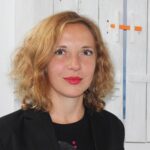
Viktorija Car
Viktorija Car (PhD in Media and Communication) is a Full Professor at the University of Split, Croatia, at the Communication and Media studies. Previously she worked for 22 years at the University of Zagreb, Faculty of Political Science, Media and Communication Department. She is a Research Fellow of the Social Science Research Center at Mississippi State University, USA.
In the focus of her scientific research are public service media, visual culture and visual media, media narratives, digital activism, media and gender studies, media and human rights, media and minority studies. She was project leader of the Digital Data and Security project (University of Zagreb, 2018-2022). She was a MC member of the COST Action IS0906: Transforming Audiences, Transforming Societies: “New challenges and methodological innovations in European media audience research“(2010-2014). She coordinated Council of Europe CARDS project Radio-television Student (2004, 300.000 Eur).
She was the founding Editor-in-Chief of the Media Studies journal (www.mediastudies.fpzg.hr) 2010-2017. She was member of the HRT Program Council (Croatian public service radio-television) 2011-2012. She worked as a journalist and a screenwriter for the Croatian Public Service Television Hrvatska televizija (HTV) 1998-2002, at the Education Program. She was general manager of the Croatian Association of Fine Artists (HDLU) 2003-2004.
She edited or is a co-editor of 6 books, Requirements for Modern Journalism Education – The Perspective of Students in South East Europe (2016), Mediji, novinarstvo i ljudska prava [Media, journalism and human rights] (2017), Mediji i javni interes [Media and public interest] (2016), Medijska pismenost – preduvjet za odgovorne medije [Media Literacy – Prerequisite for Accountable Media] (2015), Mi i oni kroz medijske naočale: medijski diskursi u Bosni i Hercegovini, Hrvatskoj i Srbiji [We and They through Media Lenses: Media Discourses in Bosnia and Herzegovina, Croatia and Serbia] (2015) and Putokazi prema slobodnim i odgovornim medijima [Guideposts to Free and Accountable Media] (2012). She is author or co-author of about 30 articles and book chapters. Her bibliography is available on https://unizg.academia.edu/ViktorijaCar
and on https://www.croris.hr/crosbi/searchByContext/2/7089


